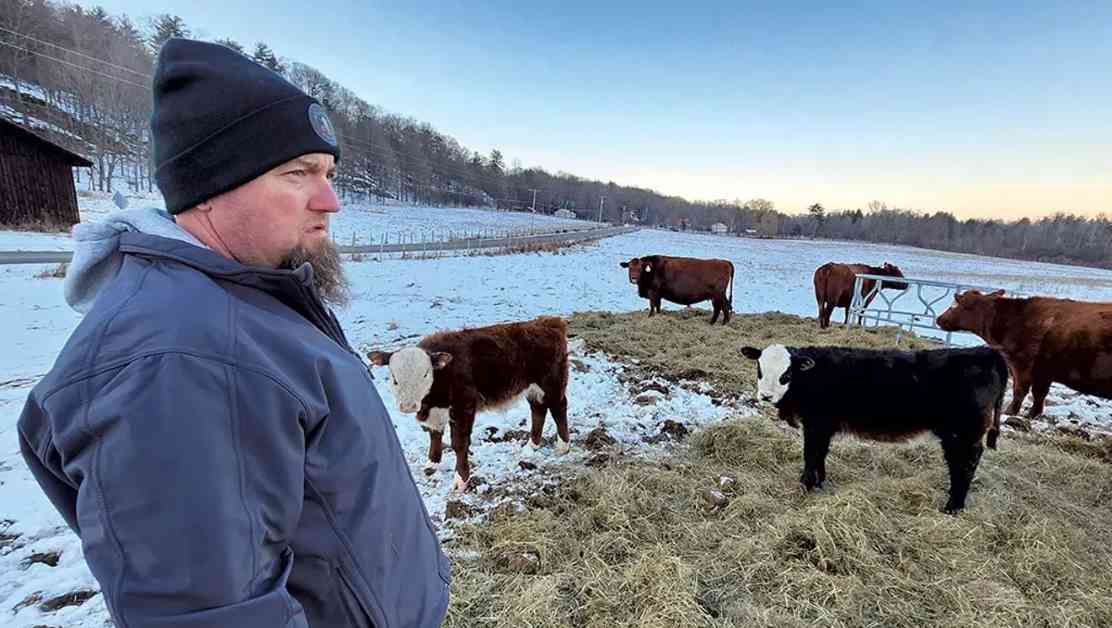Vermont Tire Shop Violates Billboard Law, State Officials Step In
Raymond Rice, a Westport, N.Y. farmer, found himself in a familiar predicament when shopping for a new tractor tire at a Vermont store. The quoted price of $1,800 left him feeling financially exploited, prompting him to venture into the tire business himself. Thus, Rice opened Rice Farm and Tires last spring, driven by the desire to provide a fair deal with his slogan, “We’ll get you a square deal on a round tire.”
To promote his new venture, Rice turned to a grassroots advertising approach, utilizing large banners on hay wagons placed along the roadside in various locations across New York and Vermont. However, this strategy quickly caught the attention of Vermont residents, who viewed the signs as illegal eyesores, violating the state’s stringent billboard laws.
Local writer Scott Wilson, taken aback by the sudden appearance of these banner ads, captured a photo and shared it online. The overwhelming consensus was that these signs not only breached legal boundaries but also disrupted Vermont’s scenic landscape. Wilson, along with others, reached out to Rice, urging him to remove the unsightly advertisements with little success.
State officials, on the other hand, have taken a firmer stance on the matter. John Kessler, an attorney representing the Agency of Commerce and Community Development, emphasized that the signs blatantly violated the state’s ban on billboards. Enacted in 1968 to preserve Vermont’s natural beauty and reduce visual clutter, the law prohibits signs for businesses not located on the premises where they are displayed.
Consequently, Vermont officials have ordered Rice to either remove or cover up the signs on his hay wagons across the state within 14 days. Failure to comply could result in daily fines of $50 per sign, totaling $300 per day. Despite the potential financial repercussions, Rice remains resolute, viewing the signs as essential for the survival of his fledgling business.
Rice, who operates a rural shop outside a small town in the Adirondack Park, faces significant challenges in attracting customers due to his remote location. The flooding last summer further isolated his business, necessitating alternative means to reach his target market of farmers throughout the Champlain Valley. Radio, television, and social media advertising proved unfeasible, leading Rice to opt for the cost-effective hay wagon signs, strategically placed on friendly farmers’ properties.
While acknowledging Vermonters’ desire to maintain unobstructed vistas, Rice contends that businesses and property owners’ rights must also be considered. He underscores the symbiotic relationship between agricultural operations and essential services like his tire shop, emphasizing the crucial role these businesses play in the local economy and community cohesion.
Despite the controversy surrounding his advertising methods, Rice remains committed to providing a valuable service to local farmers. His mobile signs, he argues, are a temporary, movable form of advertisement that will be taken down once hay season commences. Rice’s supporters, including local property owners like Tim Van De Weert and Ethan Gevry, echo his sentiments, highlighting the role of small businesses in fostering a thriving rural economy.
As the debate intensifies, with state officials and residents demanding compliance with billboard laws, Rice remains hopeful that a middle ground can be reached. While acknowledging the need to adhere to regulations, he also stresses the importance of supporting local businesses and preserving the unique character of Vermont’s agricultural landscape. In a complex tapestry of legalities and livelihoods, Rice’s tire shop stands as a symbol of the delicate balance between commercial enterprise and environmental stewardship.









